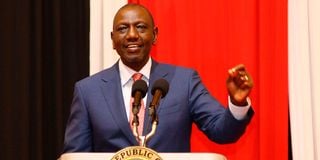Premium
Ruto’s attack on Judiciary will define his presidency

President William Ruto.
Since 2002, Kenya has enjoyed the fruits of our 3rd Liberation while the 2010 Constitution remains the backbone of our democracy.
Clinton Lawrence Rossiter III, an award-winning American historian and political scientist widely celebrated for his book The American Presidency spent 30 years studying the “Presidency”.
Rossiter analysed different roles of the President as Head of State, Party Leader, Legislative Leader and Commander-in-Chief of a Nation’s armed forces. Such an analysis demonstrates how multifaceted the office is, and how its valence changes over time.
With time, scholars would agree with Rossiter’s recognition that the power of Presidency grows concomitantly with the handling of the Nation’s foreign affairs, economic management of the country and fidelity to the rule of law.
America, just like many other democracies around the world that have Legislature, Judiciary and the Executive as distinct and independent arms of government, relies on the constitution to stipulate the powers and the clear limitation of each arm.
The most recent attacks on the Judiciary by President William Ruto clearly outlines everything that will define his Presidency. Such utterances when cheered upon and allowed to continue unchallenged would only mark the start of attempts to weaken institutions created by the Constitution.
The significance of the rule of law cannot be understated in any democratic society.
Ignoring the only institution that preserves the rule of law, as has been proposed to the President, is detrimental to our constitutionalism.
The UN High Commissioner for Human Rights 2011 report emphasised the centrality of respect for the rule of law and democracy to the protection of human rights. The absence or collapse of the rule of law results in utter pandemonium, violent conflict or repression, and gives room for gross violations of human rights.
The historic injustices perpetuated by past heads of state began in the Jomo Kenyatta era; largely bridled with arbitrary snatching of property, political detentions and assassinations, and unchecked exercise of presidential authority.
Then came the Daniel Moi authoritarian regime, perhaps the most suppressive period for Kenya’s democracy. Kenyans endured abolishment of multi-party politics, the systematic torture of political prisoners, public assault of dissenters by government officials, judicial interference and direct attack of the media and journalists.
The result of the iniquitous oppression of the Kenyan people was an attempted coup, endless anti-government protests, and agitation for a change in Kenya’s constitutional dispensation.
Thereafter, the gradual shift towards a more egalitarian Kenya began but the leadership that succeeded the first two left a lot to be desired. The Mwai Kibaki adminstration is remembered, and not very fondly, for the controversial elections which resulted in the tragic 2007/2008 Post Election Violence.
In a determined effort never to go to such levels of civil unrest and political polarisation, the people of Kenya decided the time was ripe to give themselves a new Constitution, embodying the spirit of democracy, good governance and rule of law.
Under the Jubilee government from 2013, court orders were persistently ignored. In the infamous deportation of Miguna Miguna the then Interior Principal Secretary refused not only to pay compensation to a victim of torture but also failed to appear before the Court when summons were issued.
Evidently, Kenya suffers institutional weaknesses occasioned by abuse of power and impunity, mostly by elected leaders. Our constitution establishes strong, elaborate and independent institutions, outlining how and for what purpose their powers ought to be exercised.
However, political interests and goodwill appear not to favour the strong institutions envisioned by our constitutions.
In whatever form contravention of the rule of law has manifested itself, the great personalities that have led the Law Society stood firm against impunity.
Whether by representing detainees, leading protest, challenging the Judiciary and auditing Judicial officers, enduring the extremes of politically sanctioned torture and arrest, and prosecuting petitions against the government for unconstitutional exercise of powers, the society has maintained its place in holding relevant holders of public office accountable.
When Mr Kibaki refused to appoint Kenya Anti-Corruption Commission directors, Senior Counsel Ahmednassir Abdullahi led protests against the president. When the Kibaki government threw Attorney General Amos Wako under the bus for the Anglo-leasing scandal, LSK under ProfTom Ojienda initiated judicial proceedings against the AG for his neglect of duty.
Senator. Okong’o Omogeni during his tenure led the LSK in appealing to President Kibaki to sack then Chief Justice Evan Gicheru for recommending all challenges to government directives be filed in Nairobi. Under the leadership of Kenneth Akide, LSK rejected the unilateral appointment of Justice Alnasir Visram as Chief Justice.
The pace has been set, and as a society, we must live up to the high calling and standard expected of us. We must distinguish ourselves as stalwarts of Justice and Constitutionalism.
- The writer is Vice President of the Law Society of Kenya and Lecture at the University of Nairobi | @FaithOdhiambo8 on X





